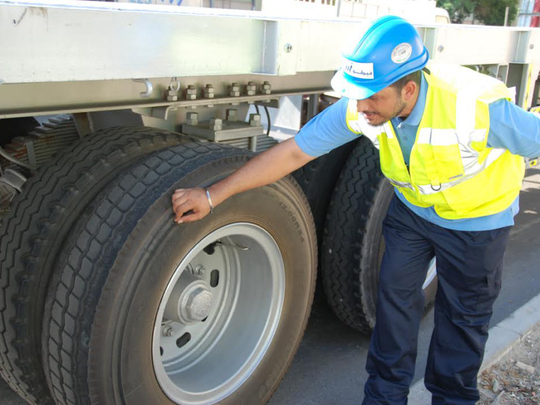
Abu Dhabi: With eight out of 10 cargo trucks failing surprise road inspections, a plan being studied by the Department of Transport (DoT) aims to make roads safer with improved regulation of freight transport vehicles while also enhancing the general perception of the freight transport sector.
Currently, heavy vehicle drivers are fined for any defects that show up in terms of the roadworthiness of their trucks and their companies are not liable to bear costs of such violations. However, the new regulations aim to change that and officials have stated that most companies have been receptive to this step.
When getting their licences renewed next year, general transport companies approaching the Department of Economic Development (DED) will be referred to the DoT to obtain a letter of no objection. For this, companies must meet a number of criteria before they can be eligible for a licence renewal.
Although details of how the DoT’s plans will be executed are to be finalised after January 31, 2015, officials have revealed that there are three main focus areas.
Mohammad Al Otaiba, Director of Freight Division at the DoT, said: “First of all, we need to have records that prove to us that daily walk-around check-ups are being conducted for vehicles of 2.5 tonnes in unladen weight. In this exercise, any visible issues with tail lights and tyres can be discovered. Secondly, companies have to provide us with documents on how they are ensuring that their drivers are not fatigued. This includes details on their working hours and corresponding pay.
“During a visit to Musaffah, Abu Dhabi, we counted around 5,000 cargo trucks parked in undesignated areas. This therefore, causes them to trespass and even obstruct traffic. As part of the new regulations, we require proof that companies are providing their drivers with a designated parking spot. All we require is a paper by the owner of the land where the vehicle is being parked, stating that he or she does not object,” Al Otaiba told Gulf News.
During a workshop held in November which was attended by representatives from around 100 cargo transport companies, officials learned that a move to introduce new laws and ensure that they are followed through was highly lauded by attendees. “Many of the bigger and more professional institutions told us that those charging less for moving goods are usually companies that do not care about their vehicles or their employees. This therefore causes a huge gap in competition, which makes it unfair for those who are actually trying to follow the rules,” Al Otaiba added.
When asked how individuals can get in touch with the DoT to better understand the new scheme and its requirements, officials said that the Freight2030 website has a menu through which industry experts and members of the public can post complaints and suggestions as well as enquiries.
“Some of the professional companies specialising in the transportation of goods actually pay close attention to matters like working hours and hygiene, even going as far as to provide their drivers with uniforms. I think that in the long run, if more decision makers followed suit and abided by the best practices of the industry, then driving heavy vehicles will become a more desirable and sought after profession,” the official said.












